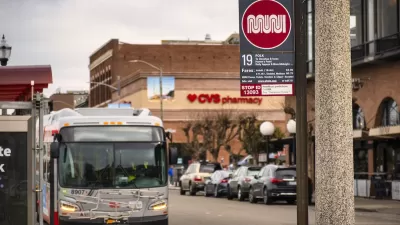With the possible entry of a fourth car sharing service into San Francisco, Daimler's Car2Go, the MTA must consider exemptions from the city's strict parking policies, specifically on-street parking in residential parking districts and metered zones.
San Francisco is well-served by car sharing services:
- non-profit City CarShare that was the first in 2001
- Zipcar
- newcomer DriveNow's all-electric cars by BMW
All three services require the customer to return the car to designated spaces that the car share company has provided. Car2Go would allow the customer to leave the vehicle on any city street.
San Francisco Chronicle transportation reporter, Michael Cabanatuan, explains what is needed for Car2Go to serve the SF market.
"Car2Go...allows its members to find the nearest car on a computer or smartphone app, walk up to it, open it with a smart card and drive it away. Drivers can park the cars, without feeding a meter, at any legal on-street parking spot.
"For Car2Go to work in San Francisco, the city would have to change its parking policies to let car-sharing drivers use on-street parking, something the Municipal Transportation Agency has been reluctant to allow, except in a few small experiments, including in front of City Hall. Parking policies would have to be changed to allow Car2Go users to ignore parking meters or residential parking restrictions."
"In all of the cities we operate," said Katie Stafford, a Car2Go spokeswoman, "we have that arrangement. It's a requirement for us to come in."
The request is under consideration by the MTA, as is a request by Supervisor Malia Cohen to provide car share to neighborhoods lacking the service.
"It's relatively easy to find a car-sharing vehicle downtown, South of Market or in the Castro, she said, but almost impossible in the city's southern neighborhoods (including the Bayview where Cohen lives)."
FULL STORY: SF car sharing revs up but hits bumps

Planetizen Federal Action Tracker
A weekly monitor of how Trump’s orders and actions are impacting planners and planning in America.

Map: Where Senate Republicans Want to Sell Your Public Lands
For public land advocates, the Senate Republicans’ proposal to sell millions of acres of public land in the West is “the biggest fight of their careers.”

Restaurant Patios Were a Pandemic Win — Why Were They so Hard to Keep?
Social distancing requirements and changes in travel patterns prompted cities to pilot new uses for street and sidewalk space. Then it got complicated.

Platform Pilsner: Vancouver Transit Agency Releases... a Beer?
TransLink will receive a portion of every sale of the four-pack.

Toronto Weighs Cheaper Transit, Parking Hikes for Major Events
Special event rates would take effect during large festivals, sports games and concerts to ‘discourage driving, manage congestion and free up space for transit.”

Berlin to Consider Car-Free Zone Larger Than Manhattan
The area bound by the 22-mile Ringbahn would still allow 12 uses of a private automobile per year per person, and several other exemptions.
Urban Design for Planners 1: Software Tools
This six-course series explores essential urban design concepts using open source software and equips planners with the tools they need to participate fully in the urban design process.
Planning for Universal Design
Learn the tools for implementing Universal Design in planning regulations.
Heyer Gruel & Associates PA
JM Goldson LLC
Custer County Colorado
City of Camden Redevelopment Agency
City of Astoria
Transportation Research & Education Center (TREC) at Portland State University
Camden Redevelopment Agency
City of Claremont
Municipality of Princeton (NJ)




























